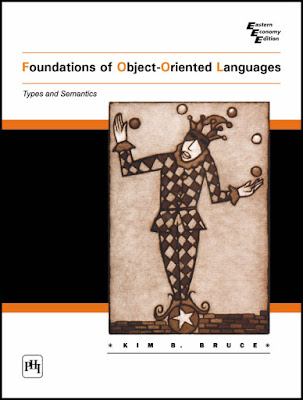Learn the FOUNDATIONS OF OBJECT-ORIENTED LANGUAGES: TYPES AND SEMANTICS with our MIT Press book by Kim B. Bruce, Professor of Computer Science, Williams College, Williams Town, Massachusetts.
Object-oriented programming has emerged as the dominant computer programming style, and object-oriented languages such as C++ and Java are immensely popular with academics and industry professionals.
This book provides a comprehensive description of the foundations of statically typed class-based object-oriented programming languages. It begins by analyzing existing object-oriented languages, paying special attention to their type systems and impediments to expressiveness. The text then examines two key features: subtypes and subclasses. After a brief introduction to the lambda calculus, it presents a prototypical object-oriented language, SOOL, a simple type system which is similar to systems of class-based object-oriented languages in common use. The text concludes with a discussion of features, such as parametric polymorphism and MyType construct, which are not yet included in most statically typed object-oriented languages.
This book, which treats a subject of current interest, should prove highly useful to students of computer science and IT as well as to professionals in the field.
KEY FEATURES
• Introduces readers to key issues in the type systems of object-oriented programming languages.
• Provides core material on class-based object-oriented languages.
• Highlights the formalism for writing the syntax and type-checking rules for programming languages.
CONTENTS
List of Figures
Preface
I Type Problems in Object-Oriented Languages
1 Introduction
2 Fundamental Concepts of Object-Oriented Languages
3 Type Problems in Object-Oriented Languages
4 Adding Expressiveness to Object-Oriented Languages
5 Understanding Subtypes
6 Type Restrictions on Subclasses
7 Varieties of Object-Oriented Programming Languages
Historical Notes and References for Section I
II Foundations: The Lambda Calculus
8 Formal Language Descriptions and the Lambda Calculus
9 The Polymorphic Lambda Calculus
Historical Notes and References for Section II
To purchase the book click http://social.phindia.com/j_KdlJm_

Leave a Reply